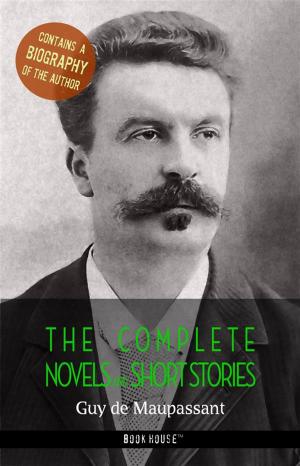THE IDIOT Classic Novels: New Illustrated [Free Audiobook Links]
Fiction & Literature, Classics, Literary| Author: | Fyodor Dostoyevsky | ISBN: | 1230000104472 |
| Publisher: | Fyodor Dostoyevsky | Publication: | February 4, 2013 |
| Imprint: | Language: | English |
| Author: | Fyodor Dostoyevsky |
| ISBN: | 1230000104472 |
| Publisher: | Fyodor Dostoyevsky |
| Publication: | February 4, 2013 |
| Imprint: | |
| Language: | English |
"THE IDIOT - Top Classic Novels" This edition included NEW illustrations + Free AudioBook Links + Clickable Table of Contents for both the list of included books and their respective chapters. Navigation couldn't be easier.
The text and chapters are perfectly set up to match the layout and feel of a physical copy, rather than being haphazardly thrown together for a quick release.
The Idiot (Russian: Идиот, Idiot) is a novel written by 19th century Russian author Fyodor Dostoyevsky. It was first published serially in The Russian Messenger between 1868 and 1869. The Idiot is ranked beside some of Dostoyevsky's other works as one of the most brilliant literary achievements of the "Golden Age" of Russian literature.
Fyodor Mikhailovich Dostoyevsky ; 11 November 1821 – 9 February 1881, sometimes transliterated Dostoevsky, was a Russian novelist, short story writer, and essayist. Dostoyevsky's literary works explore human psychology in the troubled political, social and spiritual context of 19th-century Russia. Although he began writing in the mid-1840s, his most memorable works—including Crime and Punishment, The Idiot and The Brothers Karamazov—are from his later years. His cannon consists of eleven novels, three novellas, seventeen short novels and three essays, and has been judged by many literary critics to be one of the greatest and most prominent psychologists in world literature.
Dostoyevsky was born in Moscow. He was introduced to literature at an early age—through fairy tales and legends, but also through books by English, French, German and Russian authors. His mother's sudden death in 1837, when he was in his early teens, devastated him. Around that time, he left school to enter the Nikolayev Military Engineering Institute. After graduating, he worked as an engineer and briefly enjoyed a liberal lifestyle. He soon began translating books to earn extra money. In the mid-1840s he wrote his first novel, Poor Folk, which allowed him to join St Petersburg's literary circles. In 1849 he was arrested for his involvement with the Petrashevsky Circle—a secret society of liberal utopians as well as a literary discussion group. He and other members were condemned to death, but the penalty proved to be a mock execution and the sentence was commuted to four years' hard labour in Siberia, where he was diagnosed with epilepsy during a period when his seizures increased. After his release, Dostoyevsky was forced to serve as a soldier, but was discharged due to his ill health.
In the following years Dostoyevsky worked as a journalist, publishing and editing several magazines of his own and later a serial, A Writer's Diary. He began travelling around western Europe, and developed a gambling addiction which led to financial hardship and an embarrassing period of begging for money. But through the sheer volume of his work, he eventually became one of the most widely read and renowned Russian writers. His books have been translated into more than 170 languages and have sold around 15 million copies. Dostoyevsky has influenced a multitude of writers of varying genres, from Anton Chekhov and James Joyce to Ernest Hemingway and Jean-Paul Sartre, among others.
"THE IDIOT - Top Classic Novels" This edition included NEW illustrations + Free AudioBook Links + Clickable Table of Contents for both the list of included books and their respective chapters. Navigation couldn't be easier.
The text and chapters are perfectly set up to match the layout and feel of a physical copy, rather than being haphazardly thrown together for a quick release.
The Idiot (Russian: Идиот, Idiot) is a novel written by 19th century Russian author Fyodor Dostoyevsky. It was first published serially in The Russian Messenger between 1868 and 1869. The Idiot is ranked beside some of Dostoyevsky's other works as one of the most brilliant literary achievements of the "Golden Age" of Russian literature.
Fyodor Mikhailovich Dostoyevsky ; 11 November 1821 – 9 February 1881, sometimes transliterated Dostoevsky, was a Russian novelist, short story writer, and essayist. Dostoyevsky's literary works explore human psychology in the troubled political, social and spiritual context of 19th-century Russia. Although he began writing in the mid-1840s, his most memorable works—including Crime and Punishment, The Idiot and The Brothers Karamazov—are from his later years. His cannon consists of eleven novels, three novellas, seventeen short novels and three essays, and has been judged by many literary critics to be one of the greatest and most prominent psychologists in world literature.
Dostoyevsky was born in Moscow. He was introduced to literature at an early age—through fairy tales and legends, but also through books by English, French, German and Russian authors. His mother's sudden death in 1837, when he was in his early teens, devastated him. Around that time, he left school to enter the Nikolayev Military Engineering Institute. After graduating, he worked as an engineer and briefly enjoyed a liberal lifestyle. He soon began translating books to earn extra money. In the mid-1840s he wrote his first novel, Poor Folk, which allowed him to join St Petersburg's literary circles. In 1849 he was arrested for his involvement with the Petrashevsky Circle—a secret society of liberal utopians as well as a literary discussion group. He and other members were condemned to death, but the penalty proved to be a mock execution and the sentence was commuted to four years' hard labour in Siberia, where he was diagnosed with epilepsy during a period when his seizures increased. After his release, Dostoyevsky was forced to serve as a soldier, but was discharged due to his ill health.
In the following years Dostoyevsky worked as a journalist, publishing and editing several magazines of his own and later a serial, A Writer's Diary. He began travelling around western Europe, and developed a gambling addiction which led to financial hardship and an embarrassing period of begging for money. But through the sheer volume of his work, he eventually became one of the most widely read and renowned Russian writers. His books have been translated into more than 170 languages and have sold around 15 million copies. Dostoyevsky has influenced a multitude of writers of varying genres, from Anton Chekhov and James Joyce to Ernest Hemingway and Jean-Paul Sartre, among others.
![Cover of the book THE IDIOT Classic Novels: New Illustrated [Free Audiobook Links] by Fyodor Dostoyevsky, Fyodor Dostoyevsky](https://www.kuoky.com/images/2013/february/500x500/1230000104472-u2qQ_500x.jpg)














